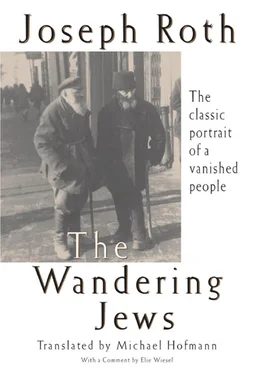In addition, it has Jewish Talmud schools and prayer-houses. You see Hebrew writing. It looks out of place on these walls. You see the spines of books behind sullied windows.
You see Jews walking, with their tallith under their arms. Emerging from the prayerhouse, going about their business. You see sick children and old women.
There are repeated attempts to transform this boring Berlinish semisanitized street into a ghetto. But Berlin is always stronger. The residents fight an unavailing fight. They want to spread out? Berlin repeatedly presses them back.
3.
I step inside one of the small bars. There are a few customers waiting for lunch in the back room. They have their hats on. The landlady is standing between the kitchen and the public bar. Her husband stands behind the counter. He has a beard made out of red thread. He seems apprehensive.
And why shouldn’t he be apprehensive? Don’t the police pay him visits? Haven’t they been there several times lately? The landlord shakes hands with me just in case. And just in case, he says: “Oh, such a customer! Has it really been so long since you last did us the honor?” A warm greeting never hurts.
Everyone drinks the classic Jewish beverage — mead. That’s the alcohol on which they can get intoxicated. They love the heavy, dark brown mead, sweet, crisp, and strong.
4.
From time to time the “Temple of Solomon” makes an appearance in Berlin. This temple has been put together by one Herr Frohmann from Drohobycz in exact accordance with the description in the Bible, only using balsa and papier-mâché and gold paint instead of the cedarwood and real gold of King Solomon.
Frohmann claims to have spent seven years building this minitemple, and I believe him. To build a model temple in accordance with the description in the Bible must cost as much labor as love.
Every single curtain, courtyard, crenellation, and altar-piece is plainly visible. The temple is on a table in the backroom of a bar. There is a smell of gefilte fish. Very few visitors come and look. The old folks are already familiar with it, and the young people want to go to Palestine and build roads, not temples.
And Frohmann travels from ghetto to ghetto, from Jew to Jew, showing off his creation. Frohmann is the guardian of tradition and of the only great architectonic work that the Jews have ever produced, and for that reason will never forget. To me Frohmann is an expression of longing, of the longing of an entire people. I saw an old Jew standing in front of the miniature temple. He was no different from his brethren who stand before the one sacred remaining wall of the real ruined temple, weeping and praying.†
5.
I stumbled upon the cabaret by chance, wandering through the dark streets on a bright evening, looking through the windows of small prayerhouses, which by day were no more than shopfronts, but in the morning and evening, houses of worship. The Jews of the East maintain a close proximity between commerce and heaven; all they need for worship is ten adult — older than thirteen— members of their faith, a cantor, and a knowledge of the cardinal points, so that they can identify Misrach , the East, the Holy Land, the source of light.
Hereabouts everything is improvised: The temple is people coming together, trade is stopping in the middle of the street. Basically, it is still the flight out of Egypt, which has been in progress now for thousands of years. The people always have to be on the alert, be packed and ready, have a piece of bread and an onion in one pocket and the tefillim in the other. Who can say whether he won’t have to resume his wanderings in another hour? Even theater happens suddenly.
The cabaret I saw was set up in the yard of a dirty old inn. It was a rectangular, glassed-in yard, whose walls were windows, giving onto corridors and passages, revealing such domestic details as beds, shirts, and buckets. A stray linden tree stood in the middle of it, representing nature. Through one or two lit-up windows you could see inside the kitchen of a kosher restaurant. Steam rose from cauldrons. A fat woman with bare and flabby forearms wielded a wooden spoon. Directly in front of the windows and half-obscuring them was a platform from which one could go straight into the main hall of the restaurant. This platform was the stage, and in front of it sat the musicians, a troupe of six men, said to be the six sons of the great Mendel from Berdiczev, whom the oldest Eastern Jews can still remember and whose violin playing was so beautiful that no one who heard it — in Lithuania, Volhynia, or Galicia — ever forgot it.
The actors who were about to appear went by the name of the Surokin Troupe. Surokin was their director, producer, and treasurer, a fat, clean-shaven man from Kovno‡ who had sung as far afield as America; a cantor and tenor; star of synagogue and opera, pampered, proud, and condescending; in equal parts entrepreneur and comrade. The audience sat at small tables, eating bread and sausages and drinking beer. They went to the kitchen to fetch food and drink, enjoyed themselves, howled and laughed. They were made up of small merchants and their families, not Orthodox but “enlightened,” as those Jews are called in the East who shave (even if only once a week) and wear European clothes. Those Jews observe the religious customs more out of pious habit than religious need; they think of God only when they need him, and, given their luck, they need him fairly frequently. They range from the cynical to the superstitious, but in certain situations all of them are apt to be maudlin and touching in their emotionalism. Where business is concerned they will deal with one another and with strangers with complete ruthlessness — but one needs only to touch a certain hidden chord within them and they will be selfless, generous, and humane. Yes, they are perfectly capable of shedding tears, especially in an open-air theater like this one.
The troupe consisted of two women and three men— but when it comes to their performance, I hardly know what to say. The entire program was improvised. First to appear was a small, skinny fellow. The nose in his face looked somehow surprised to be where it was; it was an impertinent, somewhat inquisitive, but still touching and laughable nose, more Slavic than Jewish, broad and flat, coming to an incongruously sharp point. The man with this nose was playing the batlan , a wise fool and a jester. He sang old songs and made fun of them by giving them unexpected and unsuitable twists. Then the two women sang an old song together, an actor told a funny story of Shalom Aleichem’s, and at the end, Herr Surokin, the director, recited Hebrew and Yiddish poems by recent or contemporary Jewish poets; he would recite the Hebrew verses followed by the Yiddish translation, and sometimes he would sing two or three stanzas as though he were alone in his room. And then there was a deathly hush, and the little merchants made big eyes and propped their chins on their fists, and we could hear the rustling of the linden leaves.
You are probably all familiar with Jewish melodies from the East, but I want to try to give you a sense of that music. I think I can best describe it as a mixture of Russia and Jerusalem, of popular song and psalm. It is music that blends the pathos of the synagogue with the naïveté of folk song. The words, when you read them, would seem to demand a light and jaunty melody. But when you hear the song, it’s a sad tune, “smiling through tears.” Once having heard it, you remember it weeks later; the contradiction was more apparent than real: In fact these words can only be sung to this melody. They go:
Ynter die griene Beimelach
sizzen die Mojschelach, Schlojmelach,
Eugen wie gliehende Keulelach.
Читать дальше












